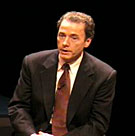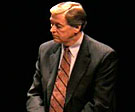Candidates Wield Sharp Rhetoric in Final Debate
By Bob Collins
November 6, 2000
Part of MPR's coverage of Campaign 2000
A sense of urgency prevailed at the final debate of U.S. Senate candidates Sunday night. With the general election capping the campaign Tuesday, James Gibson, Mark Dayton, and Rod Grams displayed a harsher tone at the Fitzgerald Theater. But none of the candidates strayed from the dominant themes of the campaign: health care and Social Security.
SEN. GRAMS DREW HISSES from Dayton supporters in the audience at the Fitzgerald Theater when he questioned whether Dayton's wealth allows him to understand issues, such as Social Security.
"You don't have a job, you don't have to pay into the system," said Grams to Dayton, the heir to a department store fortune. "If you don't pay into the system and you know you don't need it when you retire, I don't think you're as concerned as I am," said Grams.
Gibson told Dayton that he should be more open to the idea of privatization of Social Security, a plan under which citizens would be allowed to invest their own FICA withholding in private accounts. But Dayton said the idea would add to the national debt, the elimination of which has been a focus of Gibson's campaign.
Dayton said allowing people access to their Social Security withholdings endangers the security of retirees. "It's not a system designed to have people become millionaires," Dayton said. "We don't want them to lose everything either."
None of the positions on the issue highlighted by the three candidates surprised anyone in the audience, which was packed with supporters of the candidates. The Social Security issue, along with health care, have been the dominant themes of the U.S. Senate campaign over the course of several months and dozens of similar debates.
The portion of the debate that didn't involve Social Security, focused on health care and the price of prescription drugs.
Grams backs a GOP plan that would offer federal subsidies to private insurance companies to cover prescription drug costs for low-income senior citizens and seniors with high drug costs. Dayton has advocated a health insurance program financed by employers.
Grams estimated the cost to small businesses at $54 billion. He said over 20,000 jobs would be lost in Minnesota under Dayton's plan.
"Your sense of distortion makes it difficult to have a legitimate debate," Dayton retorted. "According to your proposal, a retired couple making $15,000 per year would be ineligible. Your plan provides nothing at all."
Gibson said the United States' goal should be universal health care. "The only question is how we're going to get there," Gibson said.
On other issues:
The Middle East: All three candidates seemed frustrated by the stalled peace process in the Middle East, and suggested the future of the process is up to Palestinians and Israelis, rather than the United States. "Until the PLO recognizes Israel, and the current violence ends, it will be impossible to achieve peace," Grams said.
College Costs: Dayton and Gibson disagreed on ways to reduce the cost of higher education. Dayton advocated making college tuition fully tax deductible. But Gibson said tax deductions for students don't offer much savings. Grams offered no solutions, but said previous attempts haven't worked. "Every time we raise the Pell Grant limits, college tuition goes up," Grams said.
Arts Funding: Dayton and Gibson voiced their support for federal funding of arts organizations, including public radio. Grams said he is concerned about whether the government should be financing the National Endowment for the Arts, and presently supports funding it at a reduced level.
Gun Control: All three candidates agreed on virtually all aspects of the issue. Gibson suggested the government put more money into enforcing existing laws. Grams chided Dayton for saying he was against gun registration, saying he (Dayton) had answered several surveys to the contrary.
"When it comes to double-talk, you set the standard," Dayton replied.
The audience in Sunday night's debate was more vocal and partisan than most recent debates. Moderator Gary Eichten admonished spectators several times to allow the candidates to complete their thoughts. The audience, however, clearly was taking their cues from the candidates, who have turned up the rhetoric in the final days of the campaign.
By Bob Collins
November 6, 2000
Part of MPR's coverage of Campaign 2000
A sense of urgency prevailed at the final debate of U.S. Senate candidates Sunday night. With the general election capping the campaign Tuesday, James Gibson, Mark Dayton, and Rod Grams displayed a harsher tone at the Fitzgerald Theater. But none of the candidates strayed from the dominant themes of the campaign: health care and Social Security.
| |
|
|
|
||
"You don't have a job, you don't have to pay into the system," said Grams to Dayton, the heir to a department store fortune. "If you don't pay into the system and you know you don't need it when you retire, I don't think you're as concerned as I am," said Grams.
Gibson told Dayton that he should be more open to the idea of privatization of Social Security, a plan under which citizens would be allowed to invest their own FICA withholding in private accounts. But Dayton said the idea would add to the national debt, the elimination of which has been a focus of Gibson's campaign.
Dayton said allowing people access to their Social Security withholdings endangers the security of retirees. "It's not a system designed to have people become millionaires," Dayton said. "We don't want them to lose everything either."
| |
|
|
|
||
Grams backs a GOP plan that would offer federal subsidies to private insurance companies to cover prescription drug costs for low-income senior citizens and seniors with high drug costs. Dayton has advocated a health insurance program financed by employers.
Grams estimated the cost to small businesses at $54 billion. He said over 20,000 jobs would be lost in Minnesota under Dayton's plan.
"Your sense of distortion makes it difficult to have a legitimate debate," Dayton retorted. "According to your proposal, a retired couple making $15,000 per year would be ineligible. Your plan provides nothing at all."
Gibson said the United States' goal should be universal health care. "The only question is how we're going to get there," Gibson said.
| |
|
|
|
||
The Middle East: All three candidates seemed frustrated by the stalled peace process in the Middle East, and suggested the future of the process is up to Palestinians and Israelis, rather than the United States. "Until the PLO recognizes Israel, and the current violence ends, it will be impossible to achieve peace," Grams said.
College Costs: Dayton and Gibson disagreed on ways to reduce the cost of higher education. Dayton advocated making college tuition fully tax deductible. But Gibson said tax deductions for students don't offer much savings. Grams offered no solutions, but said previous attempts haven't worked. "Every time we raise the Pell Grant limits, college tuition goes up," Grams said.
Arts Funding: Dayton and Gibson voiced their support for federal funding of arts organizations, including public radio. Grams said he is concerned about whether the government should be financing the National Endowment for the Arts, and presently supports funding it at a reduced level.
Gun Control: All three candidates agreed on virtually all aspects of the issue. Gibson suggested the government put more money into enforcing existing laws. Grams chided Dayton for saying he was against gun registration, saying he (Dayton) had answered several surveys to the contrary.
"When it comes to double-talk, you set the standard," Dayton replied.
The audience in Sunday night's debate was more vocal and partisan than most recent debates. Moderator Gary Eichten admonished spectators several times to allow the candidates to complete their thoughts. The audience, however, clearly was taking their cues from the candidates, who have turned up the rhetoric in the final days of the campaign.



